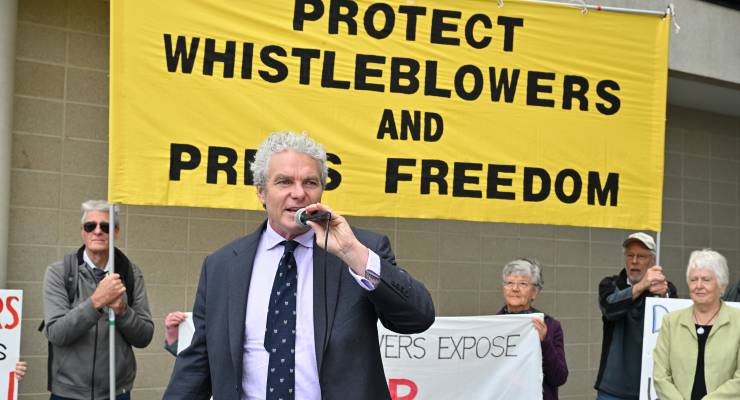
Many readers would have a passing awareness of the “Alan Johns” or “Witness J” matter, in which a former intelligence officer was secretly charged, arraigned, convicted, sentenced and imprisoned in a Canberra jail in “unprecedented” Kafkaesque style in early 2019.
But few would know of this telling exchange between Greens Senator David Shoebridge and the independent national security legislation monitor, Grant Donaldson SC, two months ago.
“All of the orders that were made in the Alan Johns matter that gave rise to [its secrecy] were made by the consent of the parties,” Donaldson said, as he fronted the Senate’s Legal and Constitutional Affairs Legislation Committee.
“Could it happen [again] under the current laws without consent [orders]?” Shoebridge asked.
“Could there be a trial that occurs with suppression of everything that occurred in the trial and in a closed court?” Donaldson said. “Yes.”
In other words, more than three years on since the Johns case was — by pure chance — brought to light, the notion that criminal prosecutions involving national security, including trials, can be conducted in wholesale secrecy remains a distinct possibility in Australia.
This is despite a change in government eight months ago, and despite the lapse of some seven months since Donaldson completed his review on the application of the National Security Information Act (the legislation giving rise to this reality) in the Johns matter.
Legal and human rights experts told Crikey this situation was profoundly worrying, not least because it obscured the frontier between an ostensibly mature liberal democracy such as Australia and autocratic regimes, where secret prosecutions are the order of the day.
“Secret trials have a long history in authoritarian states,” said Kieran Pender, a senior lawyer with the Human Rights Law Centre. “But they have no place in liberal democracies like Australia, where open justice is [meant to be] a critical safeguard.”
It was a sentiment shared by Shoebridge, who said Donaldson’s recommendations were “essential” for ensuring “transparency and accountability in our national security framework”.
“There’s no excuse for not having legislated them by now,” Shoebridge said. “Secret trials are the anathema of a justice system, and far more closely mirror a technocratic legal system that puts our liberty at stake. When these laws were passed, it was never suggested we could end up with an entirely secret trial as a result, so it’s plainly offensive to an open society to allow that state of play to continue.”
In his report, Donaldson detailed how reliance on an outwardly innocuous provision in the NSI Act (s 22) by then attorney-general Christian Porter conspired to barricade the Johns case in secrecy, seemingly forever.
No submissions were led in the ACT Supreme Court on the need for closed hearings, his report pointed out, and nor was any evidence given identifying the national security information which risked being disclosed absent such orders. The court also failed to give reasons, even in redacted form, and even declined to publish its sentencing remarks.
“This should not have happened in Alan Johns and it should never happen again,” Donaldson said in his report. “What occurred in Alan Johns, where nothing about charges, conviction and sentence was disclosed (prior to this review), is unprecedented.”
Since July, Donaldson has been undertaking a separate review into the entire operation of NSI Act, including its use in counter-terrorism cases and the prosecutions of Witness K and Bernard Collaery, as well as former military lawyer David McBride, where it was most recently invoked to deprive McBride of the only defence available to him.
Citing these cases and the “general crackdown” on whistleblowers and public interest journalism under the previous government, Griffith University expert in national security Keiran Hardy said the drift towards secrecy in this context was neither preconceived nor inevitable.
Hardy told Crikey it instead owed to two decades’ worth of “contentious and far-reaching hyper-legislation” driven by an excessive fear of terrorism matched by an excessive preoccupation with national security.
More than 130 pieces of national security legislation have been enacted since September 11 2001, and there are now some 500 secrecy offences under federal law, not including about 200 separate non-disclosure duties which function in the same manner.
“In the 20 years since 9/11, there’s been a long trajectory of governments enacting laws around secrecy and counter-terrorism,” Hardy said. “But the very scope of many of these laws was only possible because we don’t have a national human rights instrument.
“At the same time, the presence of bipartisanship and the opposition’s fear of looking soft on national security has given this legislation easy passage through the Parliament. So it was often more about the politics of national security which led us to where we are now.”
Hardy said the long-range implications carried by such laws challenged not only democratic norms and fundamental rights, but the real and perceived independence of the courts.
“Once you start having secrecy of this kind in a court system, there can be really damaging perceptions that courts are too much aligned with the executive of the day,” he said.
“The NSI Act, for example, forces the courts to operate in conditions which make it difficult for them to maintain a perception of judicial independence, because it tells them to preference national security over open justice. So, there’s certainly some urgency around fixing the NSI Act as soon as possible.”
Shoebridge was of the same view, telling Crikey it wasn’t acceptable for the government to delay reform of the NSI Act until Donaldson has delivered his more wide-ranging review, which isn’t expected until some time next year.
“We can’t afford to wait another 12 months to sort this mess out,” he said. “Especially in circumstances where there may well be secret trials and secret prosecutions currently under way.
“The very concept that you can have a secret prosecution, a secret trial, a secret jailing of an Australian citizen should trouble everybody who’s concerned about a free and open society.”
The Attorney-General’s department was asked about the likely timing of any reform to the NSI Act and confirmed, after deadline, the government agrees with Donaldson’s recommendations but would only consider legislative amendments which reflect them once his current review is complete.
A spokesperson told Crikey this would ensure a “comprehensive and robust approach” is taken to any reform, adding the government would take steps to “implement revised practices” to give practical effect to the recommendations in the interim.
The ACT Supreme Court, for its part, is yet to publish its sentencing remarks in the Johns matter, despite receiving clearance to do so.








Secret trials with secret judgements and secret sentences should never have happened at all. Dreyfus and this government should sort this out immediately to ensure it cannot happen again. There should also be a definitive statement of how many such secret cases have come to court, so we can know if Witness J was the only example. As things stand it seems possible (no matter how improbable or not it sounds) there might be any number of prisoners, guilty mostly of getting on the wrong side of a minister, in an Australian Guantanamo that we are never told about. If it has not happened yet, for as long as this legislation exists it could happen in future.
So far, on matters handled by Dreyfus, this government has proven itself better than Christian Porter and the Morrison government. But not that much better. A very mixed record. Is that all Labor aspires to?
Agree, SSR. Dreyfus might be better than Porter et al, because they were both incompetent and hopelessly anti-transparency. however, given the mandate Labor has, NOW is the time to really be pushing hard to ties up all these loose ends, and to stop the right wing oppression and anti-equality thrust. Take a strong stand!
Whole heartedly agree!
Secret trials have no place in Australia.
a bar to clear that is so low, it’s at the bottom of a coal mine.
Secret trials and jail sentences were not surprising under the Morrison Government with the assistance of several equally unlikable ministers. It is a blot on our democratic record. However we expect better from a Labor Government.
With the trial of two more whistle blowers going ahead one has to wonder what is going on. They say they are strengthening the relevant laws to provide better protection but seem to be doing nothing in practice. Dreyfus seems to be hastening with glacial slowness. He needs to come clean.
I wonder whether now they are in office they are being snowed by the police and military establishments . .
Quite possible, but that should not cause them to not stop the prosecutions.
Richard Marles is a perfect example. It appears as if the defence department has scooped out his brains and placed a mouthpiece for the USA in there instead… a US puppet.
I also wouldn’t discount the efforts of their
donors, sorry advisors, in these matters. Cough… fossil fuel industry… cough…Just wish Marles would transfer to the Liberals where he belongs.
Thank you for this important article in terms of news and providing background. We seem to be closer to people being routinely disappeared than we might like. Certainly the balance between the rights of the state and the rights of the citizen, never that good in Australia, have got worse.
Liberal democracies start from the premise that politicians and officials can’t be trusted Though of course a great many can, the protection and support for honesty is an open society and rule of law by an independent judiciary, along with regular free and fair elections. The spectre of terrorism, like the Cold War before it, threatens through overreaction to turn our state and society into the very things those proposing these laws claim they are defending against. The “war on terror” was always an ideological self-serving confection and the actions it defends have had little scrutiny, indeed the logic of “war” excludes them from it.
We can hope that the Labor party is at least more liberal than the very illiberal Liberal party (it nearly always has been) and does something to openly review and repeal most of these laws. However, until they do it’s another reason to vote Green orTeal.
Not so much that politicians and officials can’t be trusted, which would lead to them being despised: only that justice must be seen to be done.
This is genuinely scary, not the least because we’re only just becoming aware of the case. I read the Guardian article. At a time when certain sections of the web are wailing ‘conspiracy!’ with all their might, this comes along to support every delusion the rabbit-hole dwellers have been talking about.
In other words, more than three years on since the Johns case was — by pure chance — brought to light, the notion that criminal prosecutions involving national security, including trials, can be conducted in wholesale secrecy remains a distinct possibility in Australia.
This is despite a change in government eight months ago,
A government which, when in Opposition, rubber-stamped every piece of “security” legislation without so much as a murmur. Were they afraid of being seen as “soft on terrorism”, or do they really just like draconian powers as much as the other lot do?
Read my reply above.